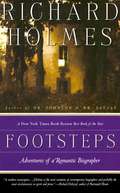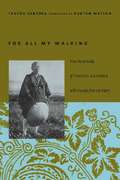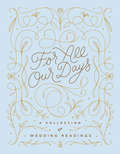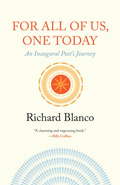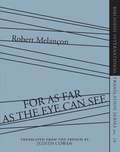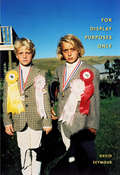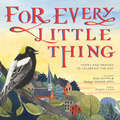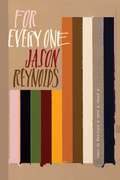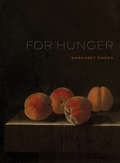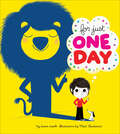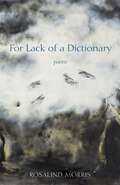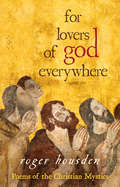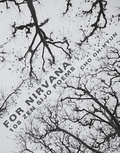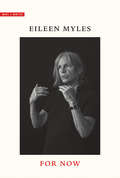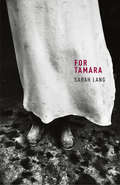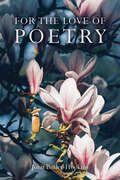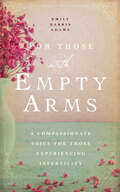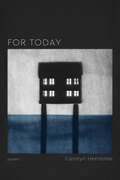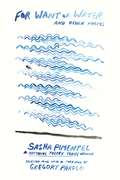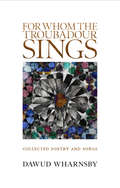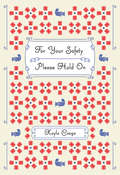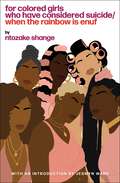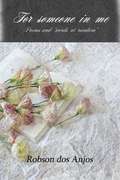- Table View
- List View
Footsteps: Adventures of a Romantic Biographer
by Richard HolmesIn this gripping book, Holmes takes us from France's Massif Central, where he followed the route taken by Robert Louis Stevenson and a sweet-natured donkey, to Mary Wollstonecraft's Revolutionary Paris, to the Italian villages where Percy Shelly tried to cast off the structures of English morality and marriage.
For All My Walking: Free-Verse Haiku of Taneda Santoka (Modern Asian Literature Series)
by Santoka TanedaIn April 1926, the Japanese poet Taneda Santoka (1882–1940) set off on the first of many walking trips, journeys in which he tramped thousands of miles through the Japanese countryside. These journeys were part of his religious training as a Buddhist monk as well as literary inspiration for his memorable and often painfully moving poems. The works he wrote during this time comprise a record of his quest for spiritual enlightenment.Although Santoka was master of conventional-style haiku, which he wrote in his youth, the vast majority of his works, and those for which he is most admired, are in free-verse form. He also left a number of diaries in which he frequently recorded the circumstances that had led to the composition of a particular poem or group of poems. In For All My Walking, master translator Burton Watson makes Santoka's life story and literary journeys available to English-speaking readers and students of haiku and Zen Buddhism. He allows us to meet Santoka directly, not by withholding his own opinions but by leaving room for us to form our own. Watson's translations bring across not only the poetry but also the emotional force at the core of the poems. This volume includes 245 of Santoka's poems and of excerpts from his prose diary, along with a chronology of his life and a compelling introduction that provides historical and biographical context to Taneda Santoka's work.
For All Our Days: A Collection of Wedding Readings
by VariousFor All Our Days is a sweeping collection of 50 poems and musings to read at a wedding ceremony.Readings range from Shakespearean sonnets and historical love letters to excerpts from classic novels and children's books—and even stand-up comedy routines. Covering a wide range of speech themes and styles, this book ensures there is something for every couple.• A must-have for any couple planning their wedding• Organized into secular and spiritual sections, with religious texts from five major faiths• A sweet reminder of what marriage is all aboutEngaged couples will love exploring For All Our Days before the big day.This elegant collection of readings is also wonderful for wedding officiants and planners alike.You'll love this book if you love books like The Knot Guide to Wedding Vows and Traditions: Readings, Rituals, Music, Dances, and Toasts by Carley Roney; The Wedding Ceremony Planner: The Essential Guide to the Most Important Part of Your Wedding Day by Judith Johnson; and A Wedding Ceremony To Remember: Perfect Words For The Perfect Wedding by Marty Younkin.
For All of Us, One Today: An Inaugural Poet's Journey
by Richard BlancoFor All of Us, One Today is a fluid, poetic account of Richard Blanco's life-changing experiences as the inaugural poet in 2013. In this brief and evocative narrative, he shares the story of the call from the White House committee and all the exhilaration and upheaval of the days that followed. For the first time, he reveals the inspiration and challenges--including his experiences as a Latino immigrant and gay man--behind the creation of the inaugural poem, "One Today," as well as two other poems commissioned for the occasion ("Mother Country" and "What We Know of Country"), published here for the first time ever, alongside translations of all three of those poems into his native Spanish. Finally, Blanco reflects on his new role as a public voice, his vision for poetry's place in our nation's consciousness, his spiritual embrace of Americans everywhere, and his renewed understanding of what it means to be an American as a result of the inauguration. Like the inaugural poem itself, For All of Us, One Today speaks to what makes this country and its people great, marking a historic moment of hope and promise in our evolving American landscape.From the Trade Paperback edition.
For As Far as the Eye Can See
by Robert MelançonIn the 144 poems of For as Far as the Eye Can See, Robert Melançon re-imagines the sonnet as a "rectangle of twelve lines," and poetry as "a monument as fragile as the grass." Impressionistic, seasonal, allusive, in language sharp and clean, this form-driven collection is both a book of hours and a measured meditation on art, nature, and the vagaries of perception.Robert Melançon is one of Québec's most revered contemporary poets and a two-time winner of the Governor General's Award. A longtime translator of Canadian poet A.M. Klein, Melançon has been the poetry columnist for Le Devoir and the Radio-Canada program En Toutes Lettres; he is also a critic and has been a professor at the University of Montreal. In addition to the Governor General's Award he is a past recipient of the Prix Victor-Barbeau and the Prix Alain-Grandbois.
For Display Purposes Only
by David SeymourIThese poems pause for the spectacle: cloning technologies, super-slo-mo photography, narcotic cab rides. Making fun of consciousness, they describe a system of tripwires, pitfalls and decoys that this notion of daily viewership entails. These poems are paeans to our facility for duplicity and self-deception, where the act of living becomes more and more like watching a ?lm in which we play no role.
For Every Little Thing: Poems and Prayers to Celebrate the Day
by Helen CannA Junior Library Guild SelectionHow do you find joy in ordinary moments? How do you mark small wonders like the return of the fireflies or a friend&’s helping hand? Arranged from waking up to falling asleep, For Every Little Thing is an engaging collection of the day and its delights. This inspirational anthology gathers classic selections, modern prayers, and new poems from multiple cultures and faiths. From Emily Dickinson to Amma, from Ken Nesbitt to Rabbi Rami M. Shapiro, fifty-one voices encourage children to be present and thankful at all hours. Accessible language and richly detailed illustrations celebrate simple pleasures like slurping noodles and splashing in puddles. Perfect for sharing around the table or at bedtime, For Every Little Thing will awaken a sense of gratitude in readers of all ages.
For Every One
by Jason Reynolds&“A lyrical masterpiece.&” —School Library Journal (starred review) Originally performed at the Kennedy Center for the unveiling of the Martin Luther King Jr. Memorial, and later as a tribute to Walter Dean Myers, this stirring and inspirational poem is New York Times bestselling author and National Book Award finalist Jason Reynolds&’s rallying cry to the young dreamers of the world.For Every One is exactly that: for every one. For every one person. For every one who has a dream. But especially for every kid. The kids who dream of being better than they are. Kids who dream of doing more than they almost dare to imagine. Kids who are like Jason Reynolds, a self-professed dreamer. Jason does not claim to know how to make dreams come true; he has, in fact, been fighting on the front line of his own battle to make his own dreams a reality. He expected to make it when he was sixteen. Then eighteen. Then twenty-five. Now, some of those expectations have been realized. But others, the most important ones, lay ahead, and a lot of them involve kids, how to inspire them: All the kids who are scared to dream, or don&’t know how to dream, or don&’t dare to dream because they&’ve NEVER seen a dream come true. Jason wants kids to know that dreams take time. They involve countless struggles. But no matter how many times a dreamer gets beat down, the drive and the passion and the hope never fully extinguishes—because simply having the dream is the start you need, or you won&’t get anywhere anyway, and that is when you have to take a leap of faith. A pitch-perfect graduation, baby, or inspirational gift for anyone who needs to me reminded of their own abilities—to dream.
For Hunger
by Margaret RondaFor Hunger, the follow-up to Margaret Ronda’s award-winning first book, Personification, offers a fierce look at the interiors of motherhood, examining what it means to become a mother and lose a mother. Centering on hunger, these vivid and crushing poems explore the mourning process and its relationship to time and nature. From its intimate lyric meditations on birth, motherhood, and parenting to poems that measure the affective patterns of mourning against seasons, constellations, tides, and reproductive gestation, these intimate poems dwell in the drifts, uncanny repetitions, and shocks that characterize the strange temporality of loss.
For Just One Day
by Laura LeuckChildren imagine turning into all sorts of animals—for just one day—in a lighthearted tale told in &“upbeat rhymes&” with &“funky modern/retro illustrations&” (Kirkus Reviews). For just one day, I&’d like to be a busy, buzzing bumble . . . BEE! What child hasn't pretended to be a monkey, a bear, or a bumblebee? After imagining the fun of transforming into a variety of animals from around the world, a sweet ending reminds little ones that the very best thing they can be is exactly who they are. Nominated for a Building Block Award from the Missouri Library Association
For Lack of a Dictionary
by Rosalind MorrisPoetry that weaves personal narratives with deep political insights, masterfully exploring the intricate intersections of history, philosophy, and emotionIn this debut collection, renowned scholar Rosalind Morris spans the lyrical landscapes of personal experience and global political dilemmas. Organized into four distinct sections, each featuring seven poems that vary in style and content, For Lack of a Dictionary reflects the diverse facets of human complexity and the struggle to find a language capable of addressing them. Beginning with a mythopoetic exploration of the self and progressing through varied voices and forms—from the epistolary and the erotic to the elegiac—the collection navigates the absences and presences that shape our interpersonal connections. From Homer’s Iliad to Hobbes’s Leviathan, and from the intimate letters of the Rosenbergs to the television broadcasts of lunar landings, Morris revisits epic figures of classical literature with a contemporary voice, concluding with poignant reflections on personal loss and the seductive allure of magical thinking in times of grief.In the tradition of Adrienne Rich and Muriel Rukeyser, Morris engages in a dialogue that challenges and enlightens, positioning For Lack of a Dictionary as a profound commentary on the intersections of personal and political realms.
For Love: Poems 1950-1960
by Robert Creeley"At its concentrated best, the sting of this poetry is indelible. Formally the poems are miniatures... but there is nothing of the miniature in the power that they release. . . . Theirs is the compression of the lyric epigram, taut, hard, constrained, graven upon the page." -Dudley Fitts, Saturday Review
For Lovers of God Everywhere: Poems Of The Christian Mystics
by Roger HousdenRoger Housden, author of the best-selling Ten Poems to Change Your Life, celebrates the growing popularity of mystical poetry with this beautiful compilation from the Christian contemplative tradition. Although the writings of the Sufi mystics (Rumi and Hafez) and the Indian mystics (Mirabai and Kabir) have reached a wide audience in recent years, the poetry of the Christian mystics has yet to be discovered by a general audience. For Lovers of God Everywhere, a collection of nearly 100 poems from both historic and contemporary writers, heralds the reemergence of the great spiritual voices of the Christian tradition-a tradition with its own love songs to God, cries of longing, and bliss of union. In this collection, Roger introduces us to some of the foremost poets of both the Eastern and Western Christian traditions. He takes us from the wisdom of the Desert Fathers to the passion of St. Augustine, through the medieval ecstasies of St. Francis of Assisi and St. Catherine of Siena, to the subtleties of St. John of the Cross and St. Teresa of Avila; and on to contemporary voices such as Rainer Maria Rilke, T.S. Eliot, and Mary Oliver. Roger's insightful commentary on each poem inspires us to take its words more deeply into our souls and shows how the mystical tradition transcends sectarian divides and speaks to the heart of humanity.
For Nirvana: 108 Zen Sijo Poems
by Heinz Insu Fenkl Oh-Hyun ChoCho Oh-Hyun was born in Miryang, South Gyeongsang Province, Korea and has lived in retreat in the mountains since becoming a novice monk at the age of seven. Writing under the Buddhist name Musan, he has composed hundreds of poems in seclusion, many in the sijo form, a relatively fixed syllabic style similar to Japanese haiku and tanka. This collection of 108 Zen sijo poems (108 representing the number of klesas, or "defilements," one must overcome to attain enlightenment) features beautiful examples of Cho Oh-Hyun's award-winning work and the expressive possibilities of sijo. These transfixing poems play with traditional religious and metaphysical themes and include a number of "story" sijo poems, a longer, less traditional style that is one of Cho Oh-Hyun's major innovations. An introduction by Kwon Youngmin, emeritus professor at Seoul National University and a major scholar of sijo, supplies a contextualizing introduction.
For Nirvana: 108 Zen Sijo Poems
by Oh-Hyun ChoFor Nirvana features exceptional examples of the poet Cho Oh-Hyun's award-winning work. Cho Oh-Hyun was born in Miryang, South Gyeongsang Province, Korea, and has lived in retreat in the mountains since becoming a novice monk at the age of seven. Writing under the Buddhist name Musan, he has composed hundreds of poems in seclusion, many in the sijo style, a relatively fixed syllabic poetic form similar to Japanese haiku and tanka. For Nirvana contains 108 Zen sijo poems (108 representing the number of klesas, or "defilements," that one must overcome to attain enlightenment). These transfixing works play with traditional religious and metaphysical themes and include a number of "story" sijo, a longer, more personal style that is one of Cho Oh-Hyun's major innovations. Kwon Youngmin, a leading scholar of sijo, provides a contextualizing introduction, and in his afterword, Heinz Insu Fenkl reflects on the unique challenges of translating the collection.
For Now (Why I Write)
by Eileen Myles&“[Myles] has a good time journeying through Hell, and like a hip Virgil, . . . is happy to show us the way.&”—NPR In this raucous meditation, Eileen Myles offers an intimate glimpse into creativity&’s immediacy. With erudition and wit, Myles recounts their early years as an awakening writer; existential struggles with landlords; storied moments with neighbors, friends, and lovers; and the textures and identities of cities and the country that reveal the nature of writing as presence in time. For Myles, time&’s &“optic quality&” is what enables writing in the first place—as attention, as devotion, as excess. It is this chronologized vision that enables the writer to love the world as it presently is, lending love a linguistic permanence amid social and political systems that threaten to eradicate it. Irreverent, generous, and always insightful, For Now is a candid record of the creative process from one of our most beloved artists.
For Tamara
by Sarah LangArranged as a mother’s survival guide to her daughter, For Tamara is a touching and inventive long poem about surviving and thriving from the author of The Work of Days.It seems simple: a long letter, from a mother to a daughter, relaying the information needed to survive on this earth. But as Sarah Lang’s second book, For Tamara, unfolds, it becomes a roughly-hewn, genre-bending, post-apocalyptic survival guide. The world with which we are familiar has ended, and in its wake are the countless dead and survivors who are little more than scavengers. The poem’s unforgettable narrator, mother to a young girl named Tamara, has decided to leave her daughter with a document that will not only express her love for her, but that will also teach her how to live. The result is a hauntingly complex artifact and monologue, heartbreakingly consistent yet wildly unexpected, a story of survival and hope that, through the force of its profound form, brings its ideas, insights, and characters blindingly to life. Against this bleak setting, we fear for Tamara's future as we ponder our own. What results is a work of unflinching tenacity and tenderness. This is a poem of abiding power.
For The Love of Poetry
by John Butler-HopkinsJohn Butler-Hopkins’ For the Love of Poetry opens, appropriately enough, with a sequence of poems about romantic love in all its aspects: the dizzying ecstasies of infatuation and first love, then the brutal lessons of rejection and betrayal, and finally the discovery of a soul mate and the development of a true, long-term relationship. By contrast, the book’s second half is concerned with the tragedy of young men going to fight in the First World War. Within this, the section ‘The Lost Letters’ combines the subjects of love and war as a soldier and his lover share memories of happier times while they live through the horrors of their current situation. If you love to read about deep and powerful human-centred emotions, this is a book for you.
For Those with Empty Arms: A Compassionate Voice For Those Experiencing Infertility
by Emily Harris AdamsAfter receiving the news that in vitro would be their only hope for biological children, award-winning poet Emily Adams had to learn to live in a new world of needles, embarrassing tests, long waiting periods, and expensive doctor’s appointments.In this beautiful and touching book of poems and essays, Emily tells the story of the diagnosis and the chaotic years that followed. Despite the many instances of disappointment, she learns how to continue to hope. Emily Adams weaves a powerful and compassionate story for any woman who is desperately trying to conceive but can’t.
For Today: Poems (Barataria Poetry)
by Carolyn HembreeA revelatory collection of poems set in the Gulf South, Carolyn Hembree’s For Today chronicles the experience of a woman who becomes a mother shortly after her father’s death and struggles to raise her child amid private and public turmoil. Written in closed and nonce forms that give way to the field composition of the maximalist title poem, the work explores grief, rage, and love in a community vulnerable to Anthropocene climate disasters. Through relationships with her daughter, neighbors, friends, ancestors, other poets (living and dead), and the earth, the speaker is freed to accept and celebrate her own perishability.
For Want of Water: and other poems
by Gregory Pardlo Sasha PimentelSearing verses set on the Mexican border about war and addiction, love and sexual violence, grief and loss, from an American Book Award–winning author. Selected by Gregory Pardlo as winner of the National Poetry Series. El Paso is one of the safest cities in the United States, while across the river, Ciudad Juárez suffers a history of femicides and a horrific drug war. Witnessing this, a Filipina’s life unravels as she tries to love an addict, the murders growing just a city—but the breadth of a country—away. This collection weaves the personal with recent history, the domestic with the tragic, asking how much “a body will hold,” reaching from the border to the poet’s own Philippines. These poems thirst in the desert, want for water, searching the brutal and tender territories between bodies, families, and nations.
For Whom the Troubadour Sings
by Dawud Wharnsby"Wharnsby's message is substantive, and his vocals are compelling--similar in style to Peter Yarrow and Paul Simon. "--Dallas Morning News Dawud Wharnsby's unconventional approach to writing and religion challenges how we look at our lives and the world through which we all journey. There was nothing more to say. There was sun-snow as I drove away. Back home was the only place to go, and I did not know, I would never see her after that day. Canadian-born Dawud Wharnsby began writing poetry, composing music, and performing in his teens. Since then he has become a voice for socially conscious and spiritually minded individuals in the twenty-first century.
For Your Safety Please Hold On
by Kayla CzagaFor Your Safety Please Hold On is a truly remarkable first poetry collection from debut talent Kayla Czaga. Her poems are already making waves-several from this collection have received award attention, including: The Fiddlehead's 23rd annual Ralph Gustafson Poetry Prize, The Malahat Review's 2012 Far Horizon's Award for Poetry and an Editor's Choice Award in ARC Poetry Magazine's 2012 Poem of the Year Contest. They have also been shortlisted for The New Quarterly's 2013 Occasional Verse Contest, longlisted for CBC's 2013 Canada Writes Poetry Contest and have appeared in literary publications across North America.The poems in For Your Safety Please Hold On move in thematic focus from family, to girlhood, to adulthood, each permeated by Czaga's lively voice and quick-witted, playful language. They test the line between honest humour and bitter reality in a sophisticated, incisive manner that tugs at the gut and feels true.The linguistic hopscotch of Czaga's poems about girlhood is often beautifully juxtaposed with feelings of menace or a first taste of smothering expectations-"She sits. She sips her bright pink fingers. / She slips into smart short haircuts, yes, / she does so, and does herself up just so." While her pin prick meditations on contemporary adulthood suggest a yearning for personal meaning and purpose on a larger scale-"I still wander, sometimes, / my coat closing the world out of my body, with pockets / full of garbage, with my slender steady want. I still / make the bed and at bedtime unmake it."The irrepressible energy of the poems in For Your Safety Please Hold On, paired with their complex balancing act between light and dark, humour and melancholy, innocence and danger, make this collection an extraordinary first offering.
For colored girls who have considered suicide/When the rainbow is enuf
by Ntozake ShangeNtozake Shange&’s classic, award-winning play encompassing the wide-ranging experiences of Black women, now with introductions by two-time National Book Award winner Jesmyn Ward and Broadway director Camille A. Brown.From its inception in California in 1974 to its Broadway revival in 2022, the Obie Award–winning for colored girls who have considered suicide/when the rainbow is enuf has excited, inspired, and transformed audiences all over the country for nearly fifty years. Passionate and fearless, Shange&’s words reveal what it meant to be a woman of color in the 20th century. First published in 1975, when it was praised by The New Yorker for &“encompassing…every feeling and experience a woman has ever had,&” for colored girls who have considered suicide/when the rainbow is enuf will be read and performed for generations to come. Now with new introductions by Jesmyn Ward and Broadway director Camille A. Brown, and one poem not included in the original, here is the complete text of a groundbreaking dramatic prose poem that resonates with unusual beauty in its fierce message to the world.
For someone in me, poems and words at random: Words that go beyond, that are beyond ...
by Robson Dos AnjosNo words to describe this book, although there are many. Try to feel each poem where nothing has been written, in the gap of not understanding for the feeling and get lost in the way through the search.
